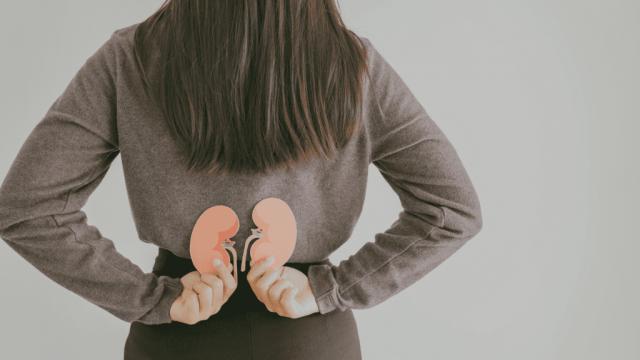Common Symptoms Of Kidney Pain:
Your kidneys, the unsung heroes of your internal landscape, tirelessly filter waste and maintain fluid balance. They’re the silent guardians of your well-being. But what happens when distress signals emerge, causing discomfort in your lower back, just below the ribs? You might be experiencing Kidney pain, and that’s precisely what we’re here to illuminate.
- Flank Pain: Kidney pain is often characterized by a dull ache or sharp pain in the back, radiating from the sides of the spine.
- Painful Urination: Kidney issues can extend their reach to your urinary system, causing pain or a burning sensation during urination – a telltale sign of infection or inflammation.
- Changes in Urine Color or Odor: Pay attention to the color and smell of your urine. Any unusual changes, such as dark, cloudy, or foul-smelling urine, could signal kidney trouble.
- Fever and Chills: Kidney infections may trigger systemic symptoms like fever and chills. If these accompany your kidney pain, it’s time to seek medical attention.
Common Causes of Kidney Pain:
The Cleveland Clinic provides valuable insights into the multifaceted causes of kidney pain. From the formation of kidney stones, urinary retention, and vesicoureteral reflux, to ureteropelvic junction obstruction, ureteral stricture, kidney infections, and more – understanding these factors is crucial.
- Kidney Stones: Kidney Stones are formed from mineral or compound buildup, kidney stones can vary in size. While small stones may pass naturally, larger ones can cause intense kidney pain if they obstruct the urinary tract.
- Urinary Retention: Inability to fully empty the bladder, either suddenly or gradually over time, can result in kidney pain.
- Vesicoureteral Reflux (VUR): The backward flow of urine from the bladder to the ureters or kidneys, more common in babies and young children.
- Ureteropelvic Junction Obstruction: Blockage at the junction of the ureter and kidney, causing flank pain radiating to the belly or groin.
- Ureteral Stricture: Narrowing of the ureter, the tubes carrying urine from the kidneys to the bladder.
- Kidney Infection (Pyelonephritis): Bacterial infection in the kidneys, presenting with symptoms like fever, chills, back or side pain, and nausea and vomiting.
- Polycystic Kidney Disease: Inherited condition featuring fluid-filled cysts, leading to kidney enlargement and pain.
- Injury or Trauma: Physical damage to the kidneys from contact sports, accidents, or blunt force trauma.
- Kidney (Renal) Cancer: Renal cell carcinoma, the most common type, may cause symptoms like blood in urine, flank pain, or the appearance of a lump on your side.
What should I do if my kidneys hurt?
Experiencing persistent kidney pain demands prompt attention and the right course of action. Here’s a comprehensive guide on what to do and when to seek care:
- Contact Your Healthcare Provider: If the discomfort in your kidneys lingers, the initial step is reaching out to your healthcare provider. Schedule an appointment to discuss your symptoms and gain professional guidance tailored to your situation.
- Emergency Room Visit: For cases involving uncontrolled pain, severe nausea or vomiting, fevers or chills, or an inability to urinate, immediate attention is imperative. Head to the emergency room promptly for comprehensive and urgent care.
- Self-Care Measures at Home: While awaiting professional advice, consider the following self-care measures to alleviate discomfort:
- -Stay Hydrated: Increase your water intake to help flush bacteria from your urinary tracts. However, it’s wise to steer clear of caffeinated drinks and alcohol during this time.
- -Use Heat Therapy: Apply a heating pad to your back, abdomen, or side to alleviate kidney pain and provide relief.
- -Pain Relievers: Over-the-counter pain relievers such as acetaminophen or ibuprofen can be taken to address fever or discomfort. Consult with a healthcare professional before using these medications if you have known liver issues.
When to Seek Medical Attention For Kidney Pain: Recognizing Red Flags
Being aware of when to seek medical attention is pivotal for effective care. If persistent kidney pain or back discomfort is accompanied by the following symptoms, it’s crucial to consult your doctor:
- -Fever or chills.
- -Nausea or vomiting preventing you from eating or drinking.
- -Oddly colored urine.
- -Painful urination.
- -Blood in urine.
- -Frequent, urgent need to urinate.
- -Appearance of solid material (kidney stones) in urine.
- -General feeling of illness or persistent lethargy.
Finding Relief at iCare ER & Urgent Care:
If you suspect kidney pain or are experiencing troubling symptoms, iCare ER & Urgent Care is here for you. With locations in Frisco, Fort Worth, and Forney, TX, our experienced team is ready to provide relief and guidance. Whether you choose to walk in or schedule an appointment online, our commitment to your comfort, health, and safety remains unwavering.
Conclusion: Understanding the signs and symptoms of kidney pain empowers you to take control of your health. At iCare ER & Urgent Care, we’re not just here to inform but to actively support your well-being. If kidney pain or related symptoms are causing concern, visit us for comprehensive and compassionate assistance. Trust iCare ER & Urgent Care to be your partner in managing kidney pain, ensuring you receive the care you deserve. Your health is our top priority!

